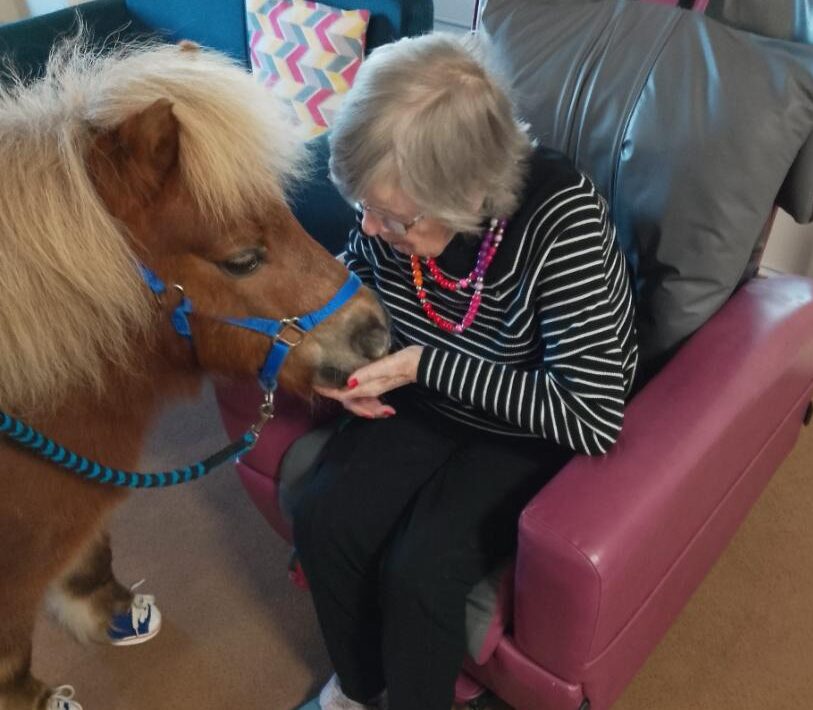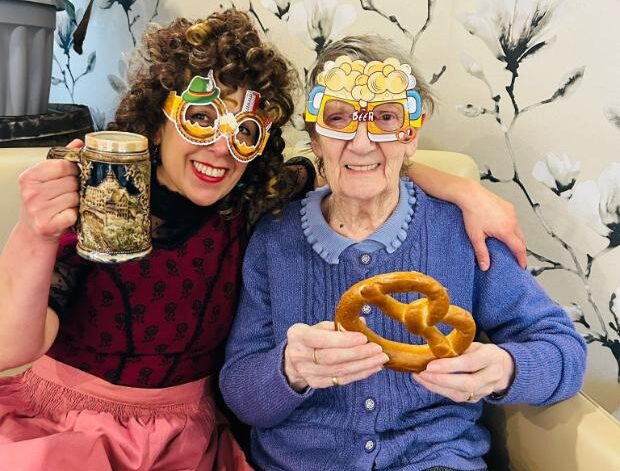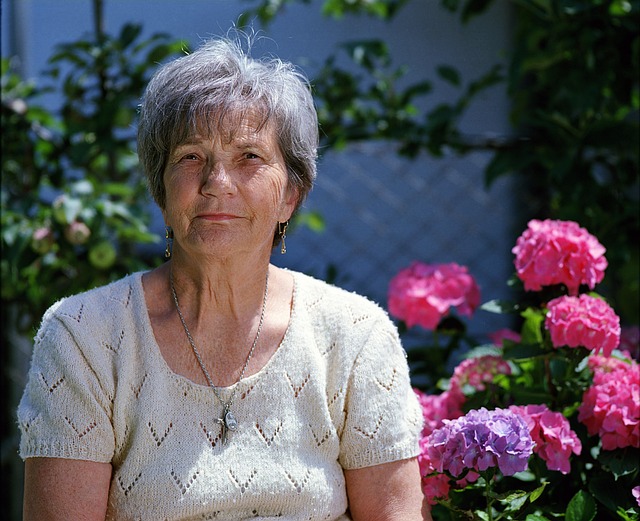The Importance of Dementia-Friendly Activities

At Lammermuir House, we understand that providing the right support for people living with dementia involves more than just medical care—it’s about enriching each person’s life in meaningful ways. One of the most powerful ways to achieve this is through dementia-friendly activities.
These activities are carefully designed to match a person’s abilities, preferences, and stage of dementia. When done right, they offer cognitive stimulation, promote emotional support, and significantly enhance mental health and wellbeing.
In this blog, we explore the importance of dementia-friendly activities and how they bring many benefits to both the person living with dementia and those who care for them.
Why Dementia-Friendly Activities Matter
As dementia progresses, it becomes increasingly difficult for a person with dementia to engage in everyday tasks. They may lose interest in former hobbies, experience frustration with complex routines, or find communication challenging. This can lead to social isolation, a drop in self confidence, and increased anxiety.
Dementia-friendly activities help to bridge these gaps by:
- Encouraging social interaction and verbal communication
- Stimulating cognitive function and memory
- Boosting self esteem and a sense of purpose
- Providing emotional support and comfort
- Promoting physical activity to maintain health
Importantly, these activities help both you and the person you care for to spend quality time together—sharing laughter, stories, and positive memories that enhance relationships and offer joy.
The Power of Meaningful Engagement
A key principle behind these activities is to ensure they are meaningful activities—not just pastimes, but experiences that resonate with the person’s life history, preferences, and feelings. Whether it’s folding laundry, listening to favourite songs, or enjoying a music session, the goal is to help the person feel connected, involved, and valued.
Research shows that meaningful engagement can improve mood, reduce behavioural symptoms of dementia, and help people with dementia maintain skills for longer.
Physical Activity and Dementia
Physical exercise is vital for maintaining mobility, mental wellbeing, and general health in older people. For those living with dementia, it can also help regulate sleep, improve appetite, and reduce anxiety.
Simple dementia-friendly forms of exercise can include:
- Walking in a garden or around the home
- Chair yoga or light stretching
- Dancing to familiar music
- Gentle ball games
- Watering plants or sweeping pathways
These activities support hand-eye coordination, balance, and circulation, while also offering a sense of accomplishment and routine.
Sensory Stimulation and Cognitive Function
Engaging the senses is another essential part of supporting people living with dementia. As memory and cognitive function decline, the senses often remain responsive and can be used to evoke long term memories.
Sensory stimulation activities include:
- Aromatherapy with calming scents like lavender
- Handling textured fabrics or objects from the past
- Tasting familiar foods
- Listening to birdsong or instrumental music
- Watching colourful visuals or nature scenes
These sensory experiences are powerful tools that provide comfort, reduce stress, and enhance the moment-to-moment experience of daily life.
Reminiscence Activities: Tapping Into the Past
Reminiscence activities are designed to evoke positive memories and foster a sense of identity by revisiting the person’s life experiences. This can be incredibly beneficial in the later stages of dementia, where short-term memory fades, but long term memories can remain intact.
Some effective reminiscence tools include:
- Looking through old family photo albums
- Playing music from the person’s youth
- Sharing stories from childhood or past holidays
- Using objects from the past (like vintage kitchenware or postcards)
- Watching classic films or old TV shows
These activities can boost confidence, stimulate conversation, and deepen connections with friends, family, and carers.
Creative and Fun Activities
Just because a person has dementia doesn’t mean they don’t enjoy having fun. In fact, creative activities can be incredibly rewarding for people with dementia, helping to unlock imagination, provide purpose, and bring great joy.
Popular dementia-friendly creative activities include:
- Painting or drawing
- Crafting seasonal decorations
- Flower arranging
- Baking simple recipes
- Colouring or making collages
- Clay modelling
These projects offer many benefits—they encourage focus, provide emotional support, and improve self esteem by giving people the chance to express themselves and be proud of what they create.
Music as Therapy
Music sessions are widely regarded as one of the most effective dementia-friendly activities. Music can cut through confusion, lift spirits, and even rekindle communication in those who are otherwise non-verbal.
Whether it’s singing along to old favourites, tapping along to a beat, or simply listening, music has a unique ability to evoke memories and improve mood.
According to the Alzheimer’s Society, music can even reduce the need for certain medications and help people maintain a connection to their own home and history.
Simple Daily Tasks with Big Impact
Never underestimate the power of involving someone in everyday tasks. Activities like:
- Folding laundry
- Setting the table
- Dusting or tidying
- Preparing simple snacks
These might seem mundane, but they can offer structure, comfort, and purpose. They also allow people with dementia to contribute meaningfully to daily life, which boosts self esteem and gives a sense of routine.
Social Interaction and Connection
Spending time with others—whether it's family, friends, or carers—is crucial for emotional health. Structured group activities or informal gatherings can help to ease social isolation and encourage verbal communication.
Some dementia-friendly ways to promote connection include:
- Group storytelling or reading
- Board games and word games
- Tea and chat sessions
- Celebrating birthdays and traditions
- Intergenerational visits with children or pets
Even a few minutes of warm conversation or shared laughter can make a world of difference to a person living with dementia.
Planning Dementia-Friendly Activities
When planning activities, it’s essential to keep the person’s current level of ability, interests, and feelings in mind. What was enjoyable and achievable one month ago may no longer be so, and flexibility is key.
Consider:
- Timing: Some people do better in the morning; others in the afternoon.
- Environment: Reduce noise and visual clutter.
- Duration: Keep sessions short and avoid overwhelming stimuli.
- Participation: Make sure the person feels involved, not passive.
Above all, focus on what brings great pleasure and dignity to the individual. Activities should be tailored to both the person and their unique story.
Creating Dementia-Friendly Communities
In many communities, there's a growing movement to make public spaces and services more dementia friendly. This includes everything from shops and libraries to cafes and transport systems adapting their environments and staff training to be more inclusive of people living with dementia.
At Lammermuir House, we’re proud to be part of this movement. Our team is dedicated to providing compassionate, personalised care that prioritises dignity, quality time, and joyful engagement every single day.
A Holistic Approach to Dementia Care
Understanding the importance of dementia-friendly activities means recognising that care isn’t just about managing symptoms—it’s about nurturing the whole person. By incorporating meaningful activities, we help maintain cognitive function, offer emotional support, and uphold the dignity of each person living with dementia.
From physical activity and creative expression, to reminiscence activities and simple routines, these engagements bring light and connection into the lives of those affected by dementia.
Whether you're a carer, relative, or friend, you can help someone feel valued, uplifted, and engaged—today and every day.
If you’d like to learn more about how Lammermuir House incorporates dementia-friendly care into our daily support, or to arrange a visit, please contact us. We’re here to support both you and your loved one every step of the way.






